Rural renovation in Baorui Village, Hainan
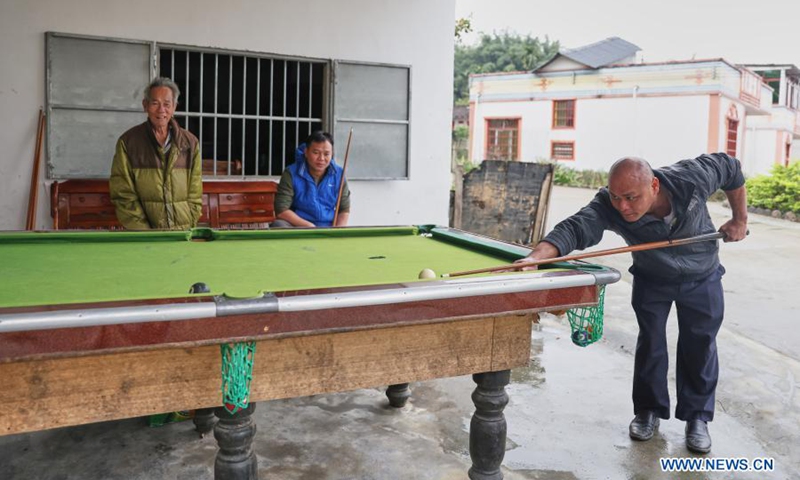
Villagers play billiards in Baorui Village, Qiongzhong County, south China's Hainan Province, Dec. 17, 2020. Visitors are likely to be impressed by brand-new residences and smooth paved roads when they come to Baorui Village in Hainan Province. But such a scene is barely imaginable back in 2017 when people of the Li ethnic group inhabiting here were mostly mired in poverty and lived in dilapidated houses. Back then, the village only had muddy paths with many places inaccessible even to motorcycle traffic. For a village which grows rubber trees as sole source of income, lack of decently paved roads had made it extremely difficult for villagers to transport and sell rubber. The year 2017 was a turning point for the villagers. In that year, thanks to a government-funded housing and infrastructure renovation plan, 62 households renovated their homes and 1.66 kilometers of roads were built. In the village, almost every family grows rubber trees for a living. To mobilize villagers, the local government bought them natural rubber price insurance to hedge against price risks. Some other impoverished villagers turned to raise farm animals as another way to cast off poverty. Only within years, the villagers here have access to tap water and natural gas, and they also have entertainment and sports facilities. All 167 residents of the 41 officially registered poor households shook off poverty by the end of 2018. (Xinhua/Zhang Liyun)
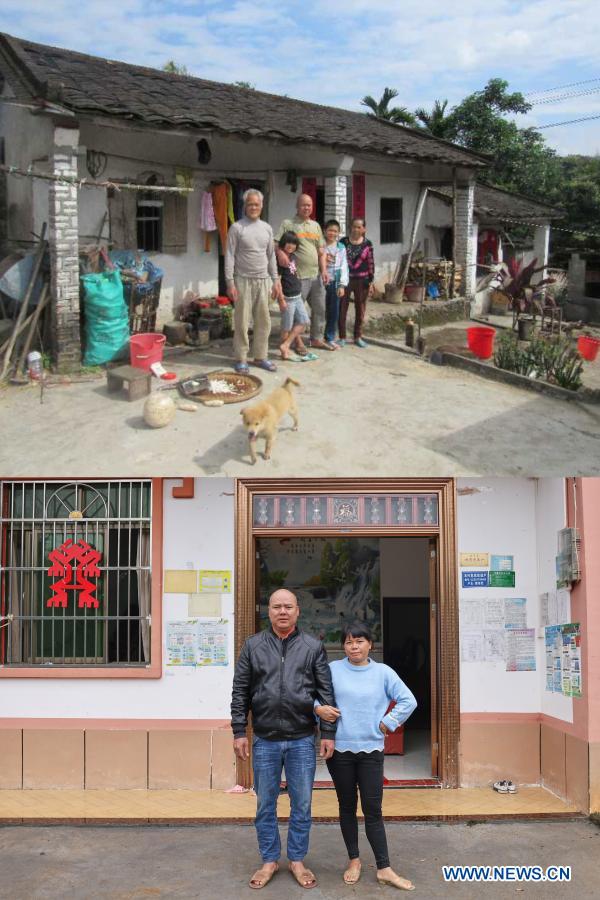
TOP: Photo taken in 2016 shows villager Tan Chuanwu and family members posing with their old house in Baorui Village, Qiongzhong County, south China's Hainan Province. BOTTOM: Photo taken on Dec. 17, 2020 by Zhang Liyun shows villager Tan Chuanwu (L) and his wife posing with their new home in Baorui Village. Visitors are likely to be impressed by brand-new residences and smooth paved roads when they come to Baorui Village in Hainan Province. But such a scene is barely imaginable back in 2017 when people of the Li ethnic group inhabiting here were mostly mired in poverty and lived in dilapidated houses. Back then, the village only had muddy paths with many places inaccessible even to motorcycle traffic. For a village which grows rubber trees as sole source of income, lack of decently paved roads had made it extremely difficult for villagers to transport and sell rubber. The year 2017 was a turning point for the villagers. In that year, thanks to a government-funded housing and infrastructure renovation plan, 62 households renovated their homes and 1.66 kilometers of roads were built. In the village, almost every family grows rubber trees for a living. To mobilize villagers, the local government bought them natural rubber price insurance to hedge against price risks. Some other impoverished villagers turned to raise farm animals as another way to cast off poverty. Only within years, the villagers here have access to tap water and natural gas, and they also have entertainment and sports facilities. All 167 residents of the 41 officially registered poor households shook off poverty by the end of 2018. (Xinhua)
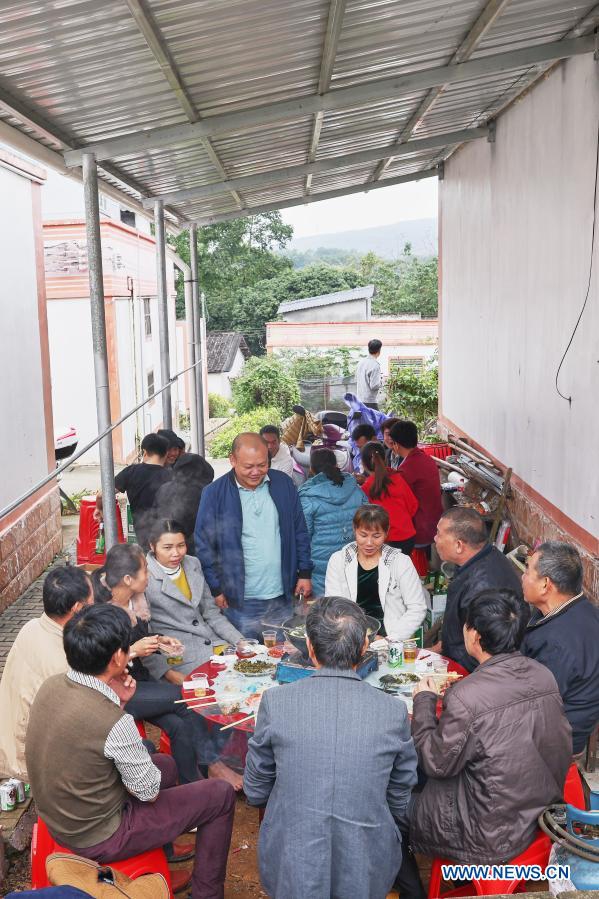
Villagers enjoy a meal together in Baorui Village, Qiongzhong County, south China's Hainan Province, Dec. 17, 2020. Visitors are likely to be impressed by brand-new residences and smooth paved roads when they come to Baorui Village in Hainan Province. But such a scene is barely imaginable back in 2017 when people of the Li ethnic group inhabiting here were mostly mired in poverty and lived in dilapidated houses. Back then, the village only had muddy paths with many places inaccessible even to motorcycle traffic. For a village which grows rubber trees as sole source of income, lack of decently paved roads had made it extremely difficult for villagers to transport and sell rubber. The year 2017 was a turning point for the villagers. In that year, thanks to a government-funded housing and infrastructure renovation plan, 62 households renovated their homes and 1.66 kilometers of roads were built. In the village, almost every family grows rubber trees for a living. To mobilize villagers, the local government bought them natural rubber price insurance to hedge against price risks. Some other impoverished villagers turned to raise farm animals as another way to cast off poverty. Only within years, the villagers here have access to tap water and natural gas, and they also have entertainment and sports facilities. All 167 residents of the 41 officially registered poor households shook off poverty by the end of 2018. (Xinhua/Zhang Liyun)
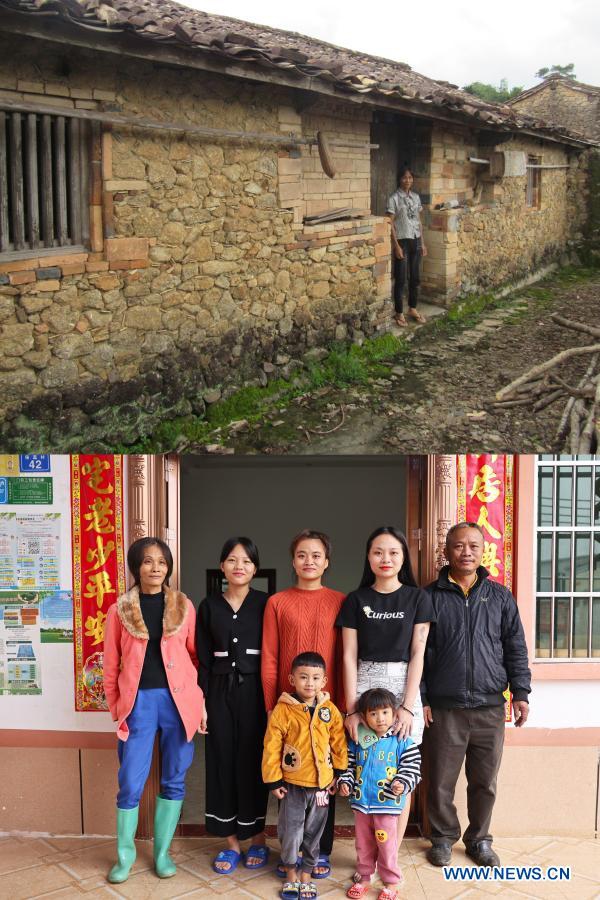
TOP: Photo taken in 2016 shows villager Chen Lixiang posing with his old house in Baorui Village, Qiongzhong County, south China's Hainan Province. BOTTOM: Photo taken on Dec. 17, 2020 by Zhang Liyun shows villager Chen Lixiang (1st L) and her family members posing with their new home in Baorui Village. Visitors are likely to be impressed by brand-new residences and smooth paved roads when they come to Baorui Village in Hainan Province. But such a scene is barely imaginable back in 2017 when people of the Li ethnic group inhabiting here were mostly mired in poverty and lived in dilapidated houses. Back then, the village only had muddy paths with many places inaccessible even to motorcycle traffic. For a village which grows rubber trees as sole source of income, lack of decently paved roads had made it extremely difficult for villagers to transport and sell rubber. The year 2017 was a turning point for the villagers. In that year, thanks to a government-funded housing and infrastructure renovation plan, 62 households renovated their homes and 1.66 kilometers of roads were built. In the village, almost every family grows rubber trees for a living. To mobilize villagers, the local government bought them natural rubber price insurance to hedge against price risks. Some other impoverished villagers turned to raise farm animals as another way to cast off poverty. Only within years, the villagers here have access to tap water and natural gas, and they also have entertainment and sports facilities. All 167 residents of the 41 officially registered poor households shook off poverty by the end of 2018. (Xinhua)
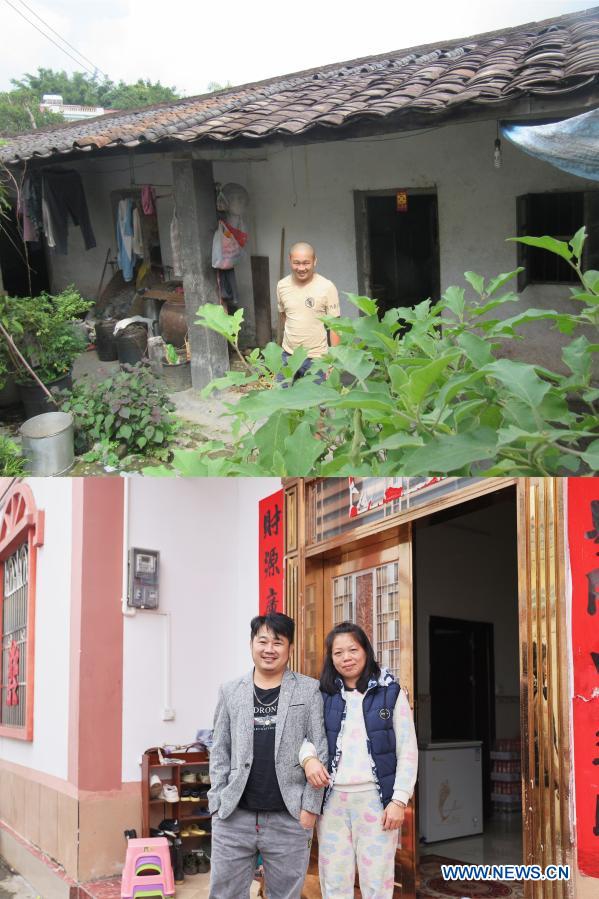
TOP: Photo taken in 2016 shows villager Wang Dechuang posing with his old house in Baorui Village, Qiongzhong County, south China's Hainan Province. BOTTOM: Photo taken on Dec. 17, 2020 by Zhang Liyun shows villager Wang Dechuang and his wife posing with their new home in Baorui Village. Visitors are likely to be impressed by brand-new residences and smooth paved roads when they come to Baorui Village in Hainan Province. But such a scene is barely imaginable back in 2017 when people of the Li ethnic group inhabiting here were mostly mired in poverty and lived in dilapidated houses. Back then, the village only had muddy paths with many places inaccessible even to motorcycle traffic. For a village which grows rubber trees as sole source of income, lack of decently paved roads had made it extremely difficult for villagers to transport and sell rubber. The year 2017 was a turning point for the villagers. In that year, thanks to a government-funded housing and infrastructure renovation plan, 62 households renovated their homes and 1.66 kilometers of roads were built. In the village, almost every family grows rubber trees for a living. To mobilize villagers, the local government bought them natural rubber price insurance to hedge against price risks. Some other impoverished villagers turned to raise farm animals as another way to cast off poverty. Only within years, the villagers here have access to tap water and natural gas, and they also have entertainment and sports facilities. All 167 residents of the 41 officially registered poor households shook off poverty by the end of 2018. (Xinhua)
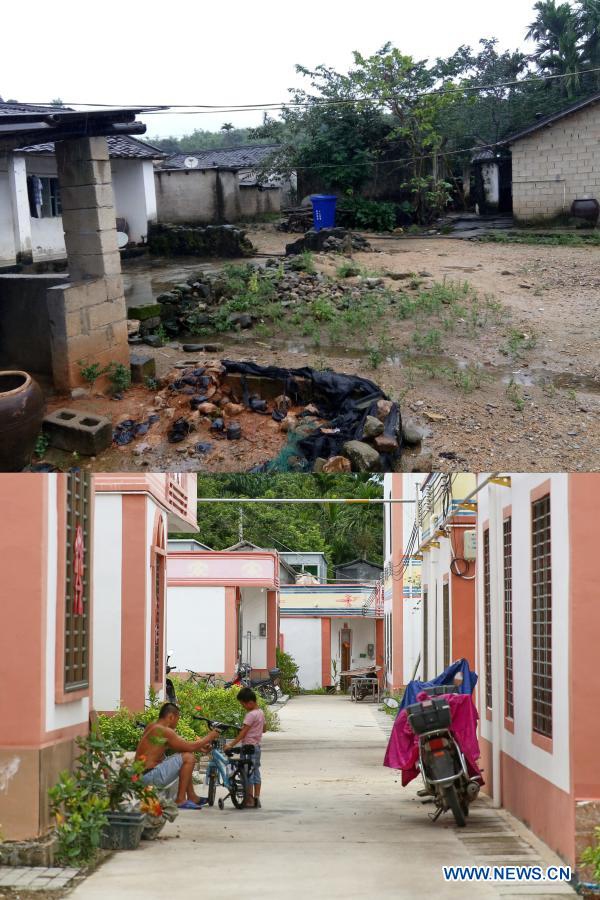
TOP: Undated photo shows a view of Baorui Village, Qiongzhong County, south China's Hainan Province before a renovation plan was implemented. BOTTOM: Photo taken on June 15, 2020 by Zhang Liyun shows a view of Baorui Village. Visitors are likely to be impressed by brand-new residences and smooth paved roads when they come to Baorui Village in Hainan Province. But such a scene is barely imaginable back in 2017 when people of the Li ethnic group inhabiting here were mostly mired in poverty and lived in dilapidated houses. Back then, the village only had muddy paths with many places inaccessible even to motorcycle traffic. For a village which grows rubber trees as sole source of income, lack of decently paved roads had made it extremely difficult for villagers to transport and sell rubber. The year 2017 was a turning point for the villagers. In that year, thanks to a government-funded housing and infrastructure renovation plan, 62 households renovated their homes and 1.66 kilometers of roads were built. In the village, almost every family grows rubber trees for a living. To mobilize villagers, the local government bought them natural rubber price insurance to hedge against price risks. Some other impoverished villagers turned to raise farm animals as another way to cast off poverty. Only within years, the villagers here have access to tap water and natural gas, and they also have entertainment and sports facilities. All 167 residents of the 41 officially registered poor households shook off poverty by the end of 2018. (Xinhua)
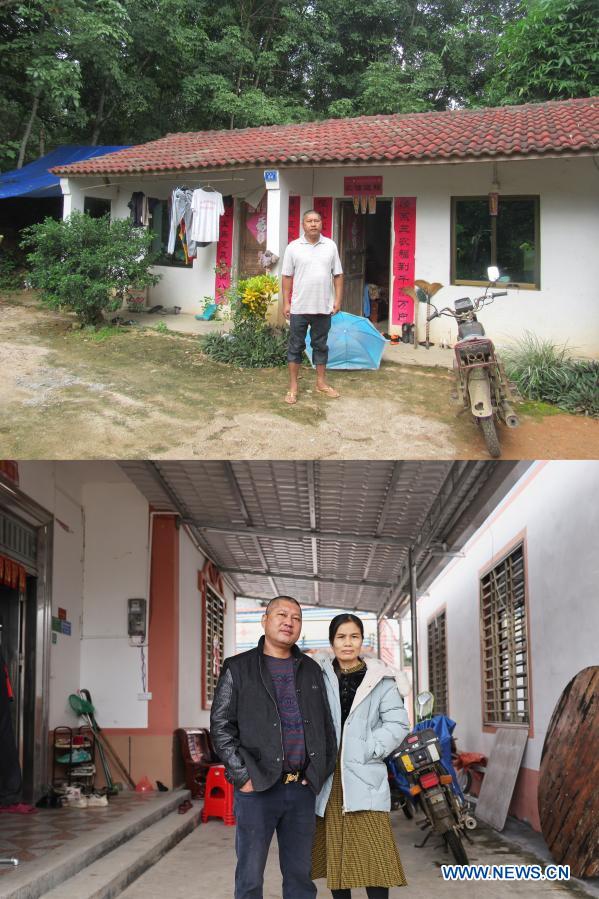
TOP: Photo taken in 2016 shows villager Wang Yongchang posing with his old house in Baorui Village, Qiongzhong County, south China's Hainan Province. BOTTOM: Photo taken on Dec. 17, 2020 by Zhang Liyun shows villager Wang Yongchang and his wife posing with their new home in Baorui Village. Visitors are likely to be impressed by brand-new residences and smooth paved roads when they come to Baorui Village in Hainan Province. But such a scene is barely imaginable back in 2017 when people of the Li ethnic group inhabiting here were mostly mired in poverty and lived in dilapidated houses. Back then, the village only had muddy paths with many places inaccessible even to motorcycle traffic. For a village which grows rubber trees as sole source of income, lack of decently paved roads had made it extremely difficult for villagers to transport and sell rubber. The year 2017 was a turning point for the villagers. In that year, thanks to a government-funded housing and infrastructure renovation plan, 62 households renovated their homes and 1.66 kilometers of roads were built. In the village, almost every family grows rubber trees for a living. To mobilize villagers, the local government bought them natural rubber price insurance to hedge against price risks. Some other impoverished villagers turned to raise farm animals as another way to cast off poverty. Only within years, the villagers here have access to tap water and natural gas, and they also have entertainment and sports facilities. All 167 residents of the 41 officially registered poor households shook off poverty by the end of 2018. (Xinhua)
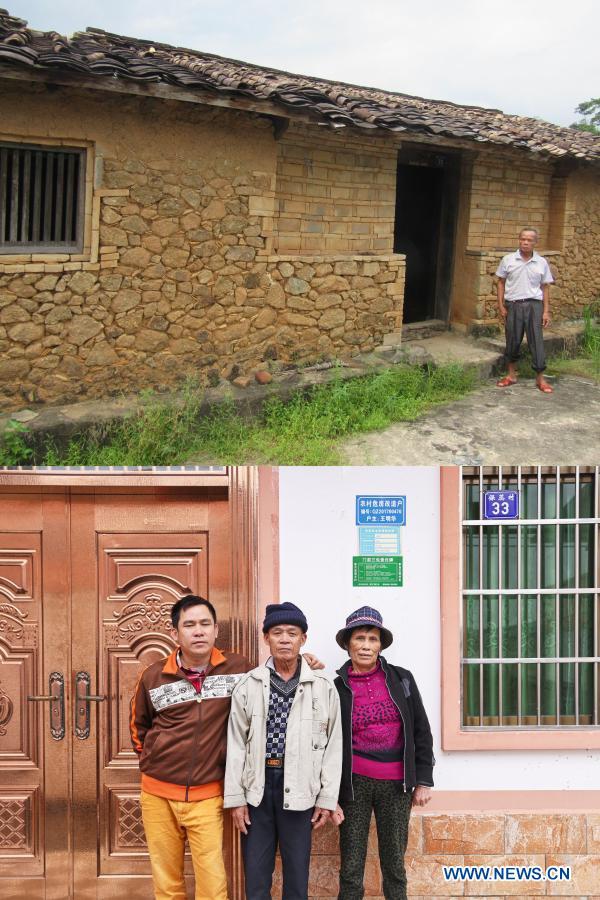
TOP: Photo taken in 2016 shows villager Wang Minghua posing with his old house in Baorui Village, Qiongzhong County, south China's Hainan Province. BOTTOM: Photo taken on Dec. 17, 2020 by Zhang Liyun shows villager Wang Minghua (C) and his family members posing with their new home in Baorui Village. Visitors are likely to be impressed by brand-new residences and smooth paved roads when they come to Baorui Village in Hainan Province. But such a scene is barely imaginable back in 2017 when people of the Li ethnic group inhabiting here were mostly mired in poverty and lived in dilapidated houses. Back then, the village only had muddy paths with many places inaccessible even to motorcycle traffic. For a village which grows rubber trees as sole source of income, lack of decently paved roads had made it extremely difficult for villagers to transport and sell rubber. The year 2017 was a turning point for the villagers. In that year, thanks to a government-funded housing and infrastructure renovation plan, 62 households renovated their homes and 1.66 kilometers of roads were built. In the village, almost every family grows rubber trees for a living. To mobilize villagers, the local government bought them natural rubber price insurance to hedge against price risks. Some other impoverished villagers turned to raise farm animals as another way to cast off poverty. Only within years, the villagers here have access to tap water and natural gas, and they also have entertainment and sports facilities. All 167 residents of the 41 officially registered poor households shook off poverty by the end of 2018. (Xinhua)
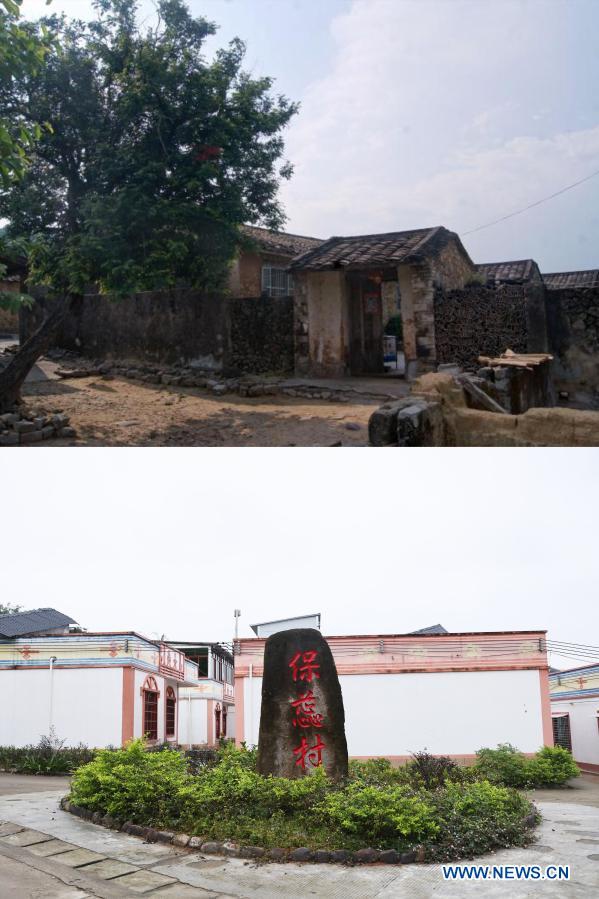
TOP: Undated photo shows a view of Baorui Village, Qiongzhong County, south China's Hainan Province before a renovation plan was implemented. BOTTOM: Photo taken on Dec. 17, 2020 by Zhang Liyun shows a view of Baorui Village. Visitors are likely to be impressed by brand-new residences and smooth paved roads when they come to Baorui Village in Hainan Province. But such a scene is barely imaginable back in 2017 when people of the Li ethnic group inhabiting here were mostly mired in poverty and lived in dilapidated houses. Back then, the village only had muddy paths with many places inaccessible even to motorcycle traffic. For a village which grows rubber trees as sole source of income, lack of decently paved roads had made it extremely difficult for villagers to transport and sell rubber. The year 2017 was a turning point for the villagers. In that year, thanks to a government-funded housing and infrastructure renovation plan, 62 households renovated their homes and 1.66 kilometers of roads were built. In the village, almost every family grows rubber trees for a living. To mobilize villagers, the local government bought them natural rubber price insurance to hedge against price risks. Some other impoverished villagers turned to raise farm animals as another way to cast off poverty. Only within years, the villagers here have access to tap water and natural gas, and they also have entertainment and sports facilities. All 167 residents of the 41 officially registered poor households shook off poverty by the end of 2018. (Xinhua)
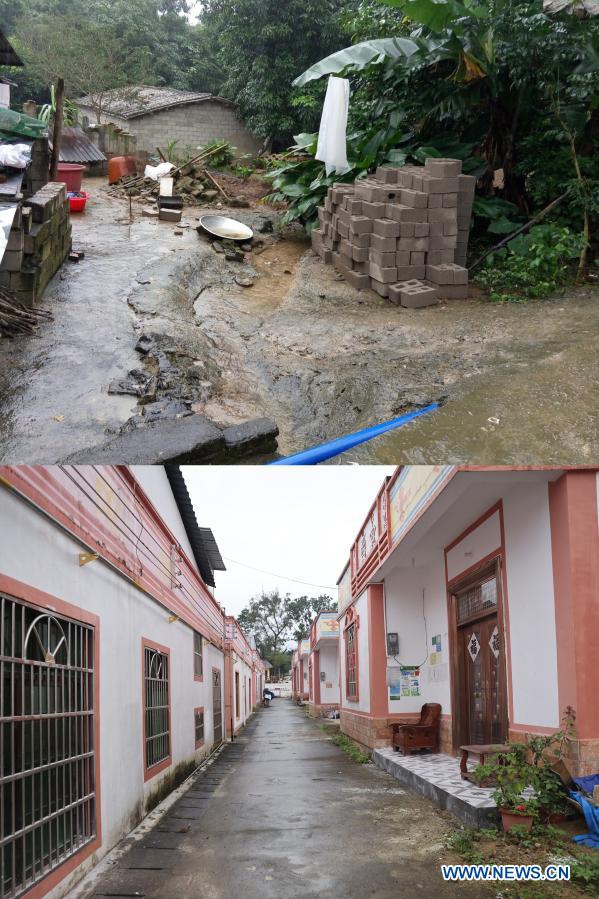
TOP: Undated photo shows a view of Baorui Village, Qiongzhong County, south China's Hainan Province before a renovation plan was implemented. BOTTOM: Photo taken on Dec. 17, 2020 by Zhang Liyun shows a view of Baorui Village. Visitors are likely to be impressed by brand-new residences and smooth paved roads when they come to Baorui Village in Hainan Province. But such a scene is barely imaginable back in 2017 when people of the Li ethnic group inhabiting here were mostly mired in poverty and lived in dilapidated houses. Back then, the village only had muddy paths with many places inaccessible even to motorcycle traffic. For a village which grows rubber trees as sole source of income, lack of decently paved roads had made it extremely difficult for villagers to transport and sell rubber. The year 2017 was a turning point for the villagers. In that year, thanks to a government-funded housing and infrastructure renovation plan, 62 households renovated their homes and 1.66 kilometers of roads were built. In the village, almost every family grows rubber trees for a living. To mobilize villagers, the local government bought them natural rubber price insurance to hedge against price risks. Some other impoverished villagers turned to raise farm animals as another way to cast off poverty. Only within years, the villagers here have access to tap water and natural gas, and they also have entertainment and sports facilities. All 167 residents of the 41 officially registered poor households shook off poverty by the end of 2018. (Xinhua)
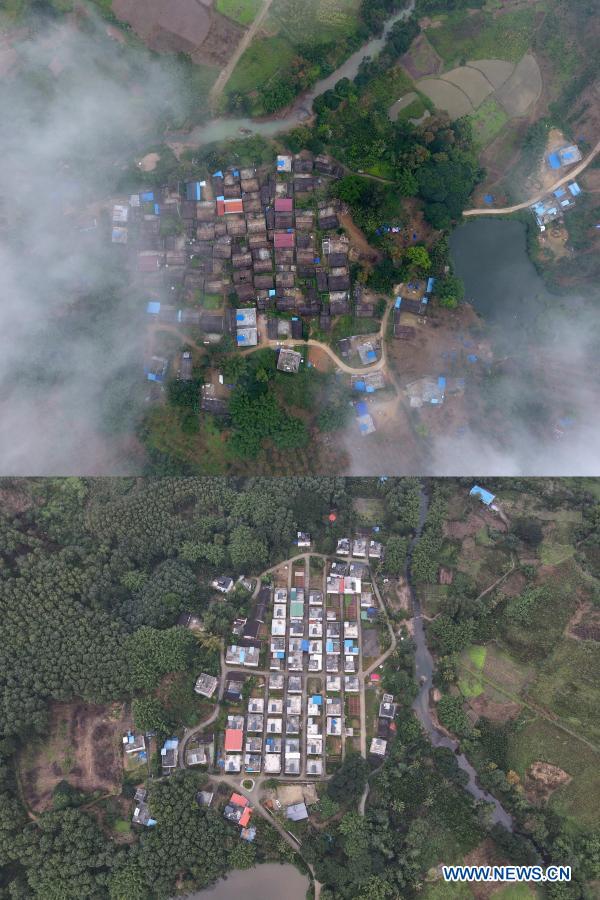
TOP: Undated aerial photo shows a view of Baorui Village, Qiongzhong County, south China's Hainan Province before a renovation plan was implemented. BOTTOM: Aerial photo taken on Dec. 17, 2020 by Zhang Liyun shows a view of Baorui Village. Visitors are likely to be impressed by brand-new residences and smooth paved roads when they come to Baorui Village in Hainan Province. But such a scene is barely imaginable back in 2017 when people of the Li ethnic group inhabiting here were mostly mired in poverty and lived in dilapidated houses. Back then, the village only had muddy paths with many places inaccessible even to motorcycle traffic. For a village which grows rubber trees as sole source of income, lack of decently paved roads had made it extremely difficult for villagers to transport and sell rubber. The year 2017 was a turning point for the villagers. In that year, thanks to a government-funded housing and infrastructure renovation plan, 62 households renovated their homes and 1.66 kilometers of roads were built. In the village, almost every family grows rubber trees for a living. To mobilize villagers, the local government bought them natural rubber price insurance to hedge against price risks. Some other impoverished villagers turned to raise farm animals as another way to cast off poverty. Only within years, the villagers here have access to tap water and natural gas, and they also have entertainment and sports facilities. All 167 residents of the 41 officially registered poor households shook off poverty by the end of 2018. (Xinhua)
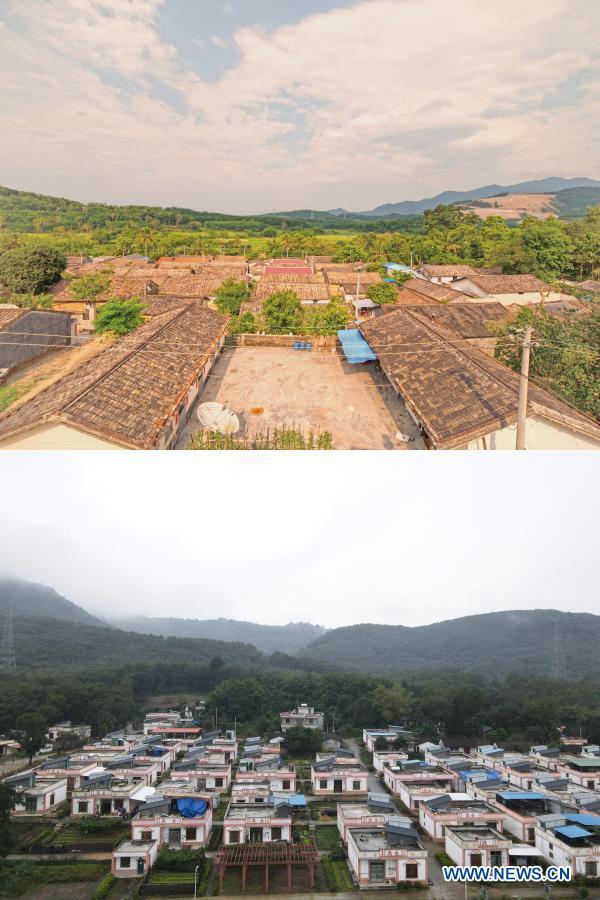
TOP: Undated photo shows a view of Baorui Village, Qiongzhong County, south China's Hainan Province before a renovation plan was implemented. BOTTOM: Aerial photo taken on Dec. 17, 2020 by Zhang Liyun shows a view of Baorui Village. Visitors are likely to be impressed by brand-new residences and smooth paved roads when they come to Baorui Village in Hainan Province. But such a scene is barely imaginable back in 2017 when people of the Li ethnic group inhabiting here were mostly mired in poverty and lived in dilapidated houses. Back then, the village only had muddy paths with many places inaccessible even to motorcycle traffic. For a village which grows rubber trees as sole source of income, lack of decently paved roads had made it extremely difficult for villagers to transport and sell rubber. The year 2017 was a turning point for the villagers. In that year, thanks to a government-funded housing and infrastructure renovation plan, 62 households renovated their homes and 1.66 kilometers of roads were built. In the village, almost every family grows rubber trees for a living. To mobilize villagers, the local government bought them natural rubber price insurance to hedge against price risks. Some other impoverished villagers turned to raise farm animals as another way to cast off poverty. Only within years, the villagers here have access to tap water and natural gas, and they also have entertainment and sports facilities. All 167 residents of the 41 officially registered poor households shook off poverty by the end of 2018. (Xinhua)